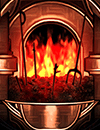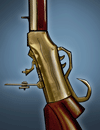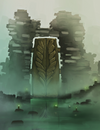The Campaign of '68: Difference between revisions
No edit summary Tag: visualeditor |
No edit summary Tag: visualeditor |
||
| Line 3: | Line 3: | ||
|image1 = Reluctantsoldier.png | |image1 = Reluctantsoldier.png | ||
|date = 1868 | |date = 1868 | ||
|caption-image1=A veteran of the Campaign}} | |caption-image1 = A veteran of the Campaign | ||
}} | |||
'''The Campaign of '68''' was a disastrous attempt by [[London|British]] forces to invade [[Hell]]. | '''The Campaign of '68''' was a disastrous attempt by [[London|British]] forces to invade [[Hell]]. | ||
==At What Cost?== | ==At What Cost?== | ||
| Line 29: | Line 30: | ||
After the war, London was grudgingly force to accept normalized diplomatic relations with Hell. The devils constructed their consulate, the [[The Brass Embassy|Brass Embassy]], on Baker Street (now known as [[Moloch Street]]) and set up an express railway back to Hell itself. They forced London to legalize trade in human souls, although it still remains strictly regulated. Hell does extensive business with London, importing souls and exporting coal, sulfur, nevercold brass, and devilbone. | After the war, London was grudgingly force to accept normalized diplomatic relations with Hell. The devils constructed their consulate, the [[The Brass Embassy|Brass Embassy]], on Baker Street (now known as [[Moloch Street]]) and set up an express railway back to Hell itself. They forced London to legalize trade in human souls, although it still remains strictly regulated. Hell does extensive business with London, importing souls and exporting coal, sulfur, nevercold brass, and devilbone. | ||
The Violet Treaty,<ref>[https://fallenlondon.wiki/wiki/Listen_to_the_Synod%27s_Opening Listen to the Synod's Opening, ''Fallen London''] ''"Learned friends, detested enemies, muddle-brained heretics, a great matter is upon us. Someone –" He glowers at you. "– has opened a Christian house of worship in the High Hinterlands. This contravenes the Violet Treaty, article seven."''</ref> signed between London and Hell, established a neutral buffer zone. The lands west of Balmoral fall under neither jurisdiction, with both parties forbidden from using the territory for espionage, political maneuvering, or religious conversion.<ref>[https://fallenlondon.wiki/wiki/Listen_to_the_Synod%27s_Opening Listen to the Synod's Opening, ''Fallen London''] ''"The land west of Balmoral falls under neither the jurisdiction of Hell nor London. It is forbidden for either side to attempt to use the territory betwixt the two for matters of espionage, politics or religious conversion."''</ref> It remains a no-man’s land, marked by an abandoned church.<ref>[https://fallenlondon.wiki/wiki/Broken_Spires Broken Spires, ''Fallen London''] ''"Beyond the hill are the battlefields of Hell. This ruined church is the last outpost before the devils' domain."''</ref> | The Violet Treaty,<ref>[https://fallenlondon.wiki/wiki/Listen_to_the_Synod%27s_Opening Listen to the Synod's Opening, ''Fallen London''] ''"Learned friends, detested enemies, muddle-brained heretics, a great matter is upon us. Someone –" He glowers at you. "– has opened a Christian house of worship in the High Hinterlands. This contravenes the Violet Treaty, article seven."''</ref> signed between London and Hell, established a neutral buffer zone. The lands west of [[Balmoral]] fall under neither jurisdiction, with both parties forbidden from using the territory for espionage, political maneuvering, or religious conversion.<ref>[https://fallenlondon.wiki/wiki/Listen_to_the_Synod%27s_Opening Listen to the Synod's Opening, ''Fallen London''] ''"The land west of Balmoral falls under neither the jurisdiction of Hell nor London. It is forbidden for either side to attempt to use the territory betwixt the two for matters of espionage, politics or religious conversion."''</ref> It remains a no-man’s land, marked by an abandoned church.<ref>[https://fallenlondon.wiki/wiki/Broken_Spires Broken Spires, ''Fallen London''] ''"Beyond the hill are the battlefields of Hell. This ruined church is the last outpost before the devils' domain."''</ref> | ||
[[File:Crownofthorns.png|thumb|100px|A Rose Afflicted Veteran]] | [[File:Crownofthorns.png|thumb|100px|A Rose Afflicted Veteran]] | ||
One can find veterans of the invasion around the city: traumatized warriors in the bars of [[Watchmaker's Hill]], peculiarly ambitious [[The Church|clergymen]], drunkards passed out in the gutter. The weapons of Hell left more than scars; some survivors carry wounds far stranger—roses that burrowed deep into their flesh.<ref>"The Thorned Manservant raises his fingertips to a flower budding above his ear. He twists it off, and blood drops from the stalk onto his shirt. "It's a war wound, from '68. I try not to complain. Some of the stories I've heard in this room – well, let's just say I got off lightly." [...]"</ref> Some were wounded much harder than others.<ref>[https://fallenlondon.wiki/wiki/For_All_the_Saints_Who_From_Their_Labours_Rest For All the Saints Who From Their Labours Rest, ''Fallen London''] ''"At last, the cloth is away, and you can see the flesh exposed. His chest looks as though it has been tattooed from the inside. Except — except the tattoo is moving, and grows out from the bone. Thorns poke upwards out of the flesh. Roses bloom across the exposed chest, which bleeds incessantly. The man is entirely perforated."''</ref> | One can find veterans of the invasion around the city: traumatized warriors in the bars of [[Watchmaker's Hill]], peculiarly ambitious [[The Church|clergymen]], drunkards passed out in the gutter.<ref>[https://fallenlondon.wiki/wiki/A_cavalry_officer A cavalry officer, ''Fallen London''] ''"That's the uniform of the 23rd Neathy Rifles. Though he's long since sold his brass buttons – for the cheapest gin, by the smell."''</ref> The weapons of Hell left more than scars; some survivors carry wounds far stranger—roses that burrowed deep into their flesh.<ref>[https://fallenlondon.wiki/wiki/A_Crown_of_Thorns A Crown of Thorns, ''Fallen London''] ''"The Thorned Manservant raises his fingertips to a flower budding above his ear. He twists it off, and blood drops from the stalk onto his shirt. "It's a war wound, from '68. I try not to complain. Some of the stories I've heard in this room – well, let's just say I got off lightly." [...]"''</ref> Some were wounded much harder than others.<ref>[https://fallenlondon.wiki/wiki/For_All_the_Saints_Who_From_Their_Labours_Rest For All the Saints Who From Their Labours Rest, ''Fallen London''] ''"At last, the cloth is away, and you can see the flesh exposed. His chest looks as though it has been tattooed from the inside. Except — except the tattoo is moving, and grows out from the bone. Thorns poke upwards out of the flesh. Roses bloom across the exposed chest, which bleeds incessantly. The man is entirely perforated."''</ref> | ||
The invasion left a long shadow on London,<ref>[https://fallenlondon.wiki/wiki/Submit_your_prisoner_to_the_ministrations_of_Hell Submit your prisoner to the ministrations of Hell, ''Fallen London''] ''"The Grey Man has feared these walls for decades, even though he has existed (in this form) only for a few months. He whimpers as you get closer. He asks you to relent. London came this direction in '68, and it was sorry, very sorry, to have done so."''</ref> but even after such a dramatic loss, there’s no way the clergy doesn’t have more plans in store for the devils. | The invasion left a long shadow on London,<ref>[https://fallenlondon.wiki/wiki/Submit_your_prisoner_to_the_ministrations_of_Hell Submit your prisoner to the ministrations of Hell, ''Fallen London''] ''"The Grey Man has feared these walls for decades, even though he has existed (in this form) only for a few months. He whimpers as you get closer. He asks you to relent. London came this direction in '68, and it was sorry, very sorry, to have done so."''</ref> but even after such a dramatic loss, there’s no way the clergy doesn’t have more plans in store for the devils. | ||
Revision as of 10:43, 15 March 2025
The Campaign of '68 was a disastrous attempt by British forces to invade Hell.
At What Cost?
In 1868, a mere six years after the Fall of London, the British Cavalry was tasked with mapping the vast new landscape of the Neath.[1] As they explored, the British forces found Rubbery Men, devils, and more excitingly, news of the lands beyond London's borders. True to both imperial and Christian ambition, they decided upon an invasion of Hell.[2]
However, it was the devils who struck first after learning of the British war plans. They invaded London through the remnant of the Fourth City, the Forgotten Quarter.[3] British forces, including the Blues and Royals, the 23rd Neathy Rifles, and both Heavy and Light Brigades, were deployed in defense. Shrouded in mist,[4] they charged blindly into the unknown—into horrors beyond imagination. The battle was a catastrophe. The remnants of the Empress’ cavalry were captured.[5] Those taken prisoner were condemned to work on Hell's slave ships, rowing endlessly on a dark river.[6] The devils demanded that for each prisoner released, they must be given a soul in echange.[7] Some soldiers' ransom were paid by their loved ones at great personal costs.[8]
Despite this crushing initial setback, a portion of the British Army managed to push forward into the hinterlands, crossing into infernal territory. One battlefield was Moulin, now a small hamlet,[9] with some historians excavating and selling the remains of the Campaign.[10] The part of Moulin now called the Waste saw the most bombardment.[11] It's littered with weapons,[12] uniforms,[13] and tools from London's veterans,[14] as well as devices of infernal manufacture.[15][16] It is also pockmarked with trenches and craters from Hell's ordinance;[17] some of these craters are snap-gaps that forcefully warp travelers from one edge to another instantaneously.[18]
Infernal strategists deliberately allowed the army to advance deeper into Hell’s territory, channeling them towards a treacherous battlefield known as the March of the Roses. The culminating engagement took place at a natural chokepoint, the Lamentations of the Violet,[19] a gorge fortified with infernal artillery and diabolic defenses.[20]

At first, British forces were hopeful, immediately attempting to scale the walls of Hell itself.[21] But they were repelled, crushed beneath an endless tide of devils and their devastating artillery.[22] The army, unwilling to retreat, resorted to a strategy of attrition. Against Hell, such a plan was sheer folly. Nevertheless, the British persisted, forced to employ trench warfare, an unfamiliar and desperate strategy.[23] The battlefield, the Fields of Roses, bore the scars of intense combat. Wrecked siege engines littered the landscape, their rusting hulks testaments to the futility of traditional warfare against Hell’s defenses.[24]

One unexpected ally emerged in the form of the Brazen Brigade, a faction of counter-revolutionary devils opposed to Hell’s ruling elite. Their assistance provided London’s army with a temporary advantage, but it was not enough to turn the tide of war.[25]
By early 1869, the campaign had reached a standstill. Soldiers sought whatever small comforts they could. On New Year's Day, some played football in the trenches for amusement. But in a cruel twist, the devils released prisoners of war to compete against their former comrades[26]—a psychological tactic designed to erode morale even further.[27]

The final days of the campaign descended into chaos. London’s forces, running out of modern ammunition, resorted to medieval siege weapons: trebuchets, mangonels, and slings.[28] Hell, by contrast, deployed an endless array of eldritch weaponry, which not only tore men apart but warped their minds, turning them into deserters or traitors.[29] The trenches became mass graves.[30][31] London’s troops, exhausted and outmatched, broke.[32]
Desertion was rampant. Some soldiers fled due to the unnatural effects of Hell’s weapons; others simply realized the hopelessness of their cause. Those caught were executed by their own officers.[33] Some tried to escape back to London, while others, lost and disoriented, stumbled straight into the waiting hands of Hell’s forces.[34] Infernal cavalry swept across the battlefield, rounding up the survivors and driving them into captivity.[35]

Those who made it back to London brought with them accounts of terrifying sights: fields of burning roses, devilbone churches, brass triremes, a vast and pitiless bureaucracy, a throne that stands in the shadow of a gallows.[36] Those who were captured were not the same when they returned. Some had been twisted into devils.[37] Others had become sapient roses.[38]
Aftermath
After the war, London was grudgingly force to accept normalized diplomatic relations with Hell. The devils constructed their consulate, the Brass Embassy, on Baker Street (now known as Moloch Street) and set up an express railway back to Hell itself. They forced London to legalize trade in human souls, although it still remains strictly regulated. Hell does extensive business with London, importing souls and exporting coal, sulfur, nevercold brass, and devilbone.
The Violet Treaty,[39] signed between London and Hell, established a neutral buffer zone. The lands west of Balmoral fall under neither jurisdiction, with both parties forbidden from using the territory for espionage, political maneuvering, or religious conversion.[40] It remains a no-man’s land, marked by an abandoned church.[41]

One can find veterans of the invasion around the city: traumatized warriors in the bars of Watchmaker's Hill, peculiarly ambitious clergymen, drunkards passed out in the gutter.[42] The weapons of Hell left more than scars; some survivors carry wounds far stranger—roses that burrowed deep into their flesh.[43] Some were wounded much harder than others.[44]
The invasion left a long shadow on London,[45] but even after such a dramatic loss, there’s no way the clergy doesn’t have more plans in store for the devils.
Veterans
Among those captured by Hell, the Regretful Soldier bears a tragic legacy. His wife, in a desperate act of devotion, traded her soul for his release. Yet freedom brought him no solace. Wracked with guilt and haunted by what he had witnessed, he turned to drink, seeking refuge in oblivion.
The Bishop of Southwark is a notable veteran of the campaign. He was the chaplain[46] for a brigade that was captured in battle; his scream of pain after touching a fiery hellish rose alerted the devils to the regiment's presence.[47] He was forced to work on Hell's galleys, until he signed a contract allowing him to keep his soul and go back to London. He became Bishop sometime after the war ended.[48]
One of only two survivors from his regiment, the Thorned Manservant now serves at the Palace. He organizes meetings for veterans, offering them a space to share their memories and grief.[49] His master, the Bellicose Prince—one of the Empress’s sons—secretly joined the campaign, driven by youthful zeal and reckless ambition. Though he survived, the war left deep wounds upon his soul, and he continues to torment himself over the horrors he witnessed and the choices he made.[50]
Many veterans whisper of a figure resembling Nicator among the ranks of the campaign. Some claim he led the charge to defend London against the devils in the Forgotten Quarter. Whether these accounts are true remains uncertain.[51]
References
|